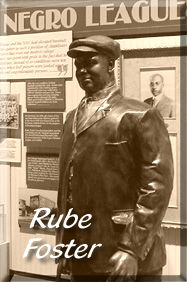
|
|
Negro League baseball represents one of the predominant influences on black society in the first half of the twentieth century. It influenced the everyday lives of the players and fans as well as society at large. In many ways it was a cornerstone of life in black America. From the 1880s into the 1960s, a majority of American states enforced segregation through "Jim Crow" laws (so called after a black character in minstrel shows). From Delaware to California, and from North Dakota to Texas, many states (and cities, too) could impose legal punishments on people for consorting with members of another race. The most common types of laws forbade intermarriage and ordered business owners and public institutions to keep their black and white clientele separated. Life for black Americans did not stop. In fact, the Negro leagues were created because of the importance of sports in the psychological life of a people; they became a particularly important community institution. Besides providing enormous satisfaction and entertainment, the black players realized an essential goal of black culture, namely, to prove that blacks and whites were equal, and they proved it in a way that common people could understand. Challenged by a biased public, the Negro Leagues formed the cornerstone of a segregated society. Implicit in the existence of the leagues were the beliefs that the black community produced athletic talent worthy of true, professional status and that, in spite of discrimination, this talent must be developed and displayed.
The enterprising spirit and determination of the captains of black baseball
present symbolic challenge to the flawed foundations of segregation.
More concretely, by presenting the tale of black
players to the public, the Negro Leagues
made possible a comparison of their talents against those of professional,
white players - a comparison which showed the black player to be the
equal of any. |





